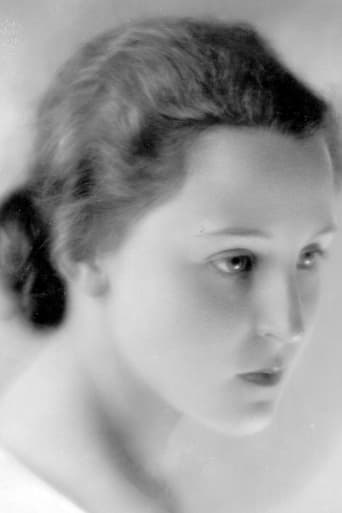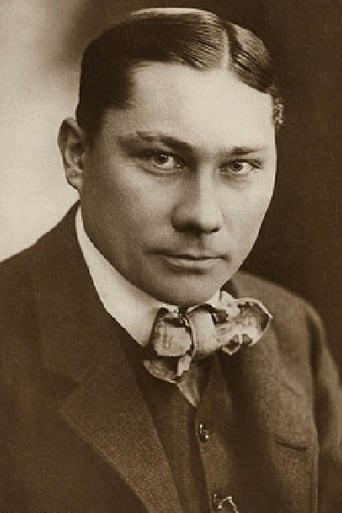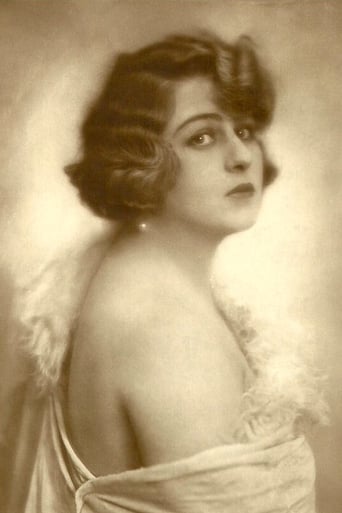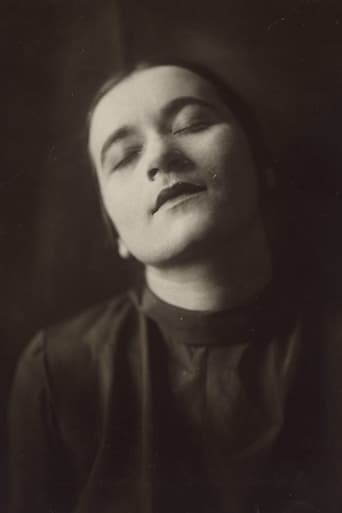BootDigest
Such a frustrating disappointment
filippaberry84
I think this is a new genre that they're all sort of working their way through it and haven't got all the kinks worked out yet but it's a genre that works for me.
Micah Lloyd
Excellent characters with emotional depth. My wife, daughter and granddaughter all enjoyed it...and me, too! Very good movie! You won't be disappointed.
Horst in Translation (filmreviews@web.de)
There exist several versions of this "Alraune" movie, also another starring Brigitte Helm, but this very old one we have here is from 1928, so almost 90 years old and possibly the most known film. It is in black-and-white and silent and stars the aforementioned Brigitte Helm ("Metropolis") as the main character. The movie is fairly long for its time, almost runs for 110 minutes and features some of the great silent film actors. The writer and director is Henrik Galeen, who himself id known for writing the scripts and screenplay for some of the great classics from that era of German cinema. So, the premise is pretty good, but the overall outcome here is a bit disappointing I must say. The reason may be that I am not the greatest silent film fan at all, but still I felt that the plot was extremely shallow, especially for a film with such a massive runtime. There was not a single character that I really truly cared for and that includes Helm's main character as well as the minor players. I give "Alraune" a thumbs down. This one is really only worth seeing for the very biggest silent film enthusiasts. Everybody else will be as bored as I was.
rdjeffers
Poison AngelBased on the medieval legend of the Mandrake, a root, which grew beneath the gallows from the semen of hanged men, Hanns Heinz Ewers novel Alraune was brought to the screen in 1928 by Ama-Film GmbH and director Henrik Galeen (The Student of Prague 1926, Nosferatu 1922 – as screenwriter). Paul Wegener (The Golem 1920, The Magician 1926) stars as Professor Jakob ten Brinken, the "world famous authority on genetic cross-breeding", who implants a prostitute with the 'seed' of a hanged man in order to study the effects of environment over genetics on the offspring. The resulting child is Alraune, whom Brinken calls 'Mandrake', played by Brigitte Helm (Metropolis 1927, The Love of Jeanne Ney 1927). Alraune is raised in a convent, ignorant of her origins, believing Brinken is her father. Just as the Professor is convinced, his 'experiment' has overcome her genetic history she runs away with a boy and begins a life of troubled encounters with men. Helm is both innocent, alluring and at times intensely evil in this captivating performance of a lovely young girl, both attracted to and in conflict with the men in her life. As in the novel, which this film closely follows, the idea and understanding of love is unknown to Alraune. As she chats with a circus magician she shares her train compartment with, his real intentions unknown to Alraune, he entertains her with slight-of-hand tricks. He produces a live mouse that he places on her leg and it quickly crawls under her skirt as the girl calmly observes. " What? You are not afraid of mice? Little girl. You will make something of yourself." While the film was heavily censored in 1928, this surviving scene must have been, and remains today, tremendously provocative. Brinken eventually finds Alraune, living as a circus performer, just as she rebels against the magician's attempts to control her flirtations with another man. " Stop me if you can!" In one of the most electrifying scenes in all of Weimar Cinema, Alraune opens the door to the lion's cage now on the stage and steps in. As the curtain opens, the crowd reacts in utter horror while, outside the cage, circus performers furiously run in all directions. Alraune stands before several enormous lions she teased only moments earlier, completely motionless, as the camera cuts to a close-up of her penetrating eyes. Once they are away from the circus, Brinken determines to start a new life with the girl, but Alraune again plots to run away with another man. As she is leaving, she finds the Professor's diary and discovers the truth of her existence, "Where do I belong in society?" Alraune bitterly decides to stay with Brinken and seek her revenge, feeling unfit for the man she now loves. She tortures Brinken by constantly flirting with men. As her ultimate insult, Alraune, dressed from head to tow in shimmering silk, seduces Brinken, "Do you really think I haven't known all along that I am not your daughter?" She runs off, depriving him and the torture continues. Financially and morally destitute, Brinken confronts Alraune as she packs her bags to leave. In a harrowing scene, he chases her from room to room with a large knife. Just as her death seems imminent, Alraune is saved by her lover and Brinken is left to suffer "the hell of loneliness and insanity." An overlooked treasure, Alraune represents the height of silent film in the Weimar era. With the exception of early scenes featuring Alraune's 'mother' and the convent, the film is entirely occupied by men, surrounding Helm like the unnoticed setting of a luminous jewel.
samirw
I've just seen the world theatrical premier of the Munich Filmmuseum's restoration of this classic, presented by University of Chicago's Documentary Film Group in cooperation with Chicago's Goethe Institute and Lufthansa. Live piano accompaniment was provided by the excellent Aljoshe Zimmerman with an introduction by Stefan Drößler, director of the Filmmuseum. Zimmerman composed the score for the Filmmuseum and additionally accompanied "Nosferatu, eine Symphonie des Grauens" (also restored and presented as a double feature). The restoration was pieced together largely from surviving reels from Russia and Denmark, which focused on Alraune's mother and father, respectively. The restoration sports quite a few intertitles, in German, some of which were present in the original. Absolutely remarkable, and a must for anyone who appreciates excellent cinema.
CParis
ALRAUNE is another spectacular piece of early German cinema, surprisingly overlooked by film buffs and historians alike. The film is not "expressionist" in the way of CALIGARI or METROPOLIS, but fans of those films will enjoy it regardless.The plot (without spoilers) is creepy to begin with: a scientist (Paul Wegener) decides to experiment with humanity by creating a woman from the seed of a hanged man impregnated into a prostitute. Using two reprehensible creatures as parents, as well as artificial insemination (which is implied in the film, not stated as some articles on the film have indicated), the doctor aims to see if an individual's humanity is the product of nature or nurture.The woman he creates, called Alraune (although called "Mandrake" in the english title cards, a name ill-fitting the overtly feminine character) is played by Brigitte Helm. No better casting for this part could have been made at the time: Helm's performance here far surpasses that of her most famous film role (the robotrix from Fritz Lang's METROPOLIS) and (I feel) solidifies her position as top femme fatale of that era. Her sensuous, provocative movements, gestures, stares and sneers even outshine those of Marlene Deitrich in years to come. There are moments where Helm slips into the silliness that harms her role as Maria in METROPOLIS (flailing about wantonly), but these are kept to a minimum by the director.Paul Wegener, as the doctor, also proves to be an actor out of time. His performance would stand up to modern criticism, as it lacks the usual melodramatic facial manipulations or exaggerated movements of many silent film male stars. Rather, Wegener tells us his characters thoughts and feeling swith subtle glances, almost imperceptible lip movements, and ingenius body posture. Wegener, you may recall, played the great clay giant Der Golem in his film of the same name; to see Wegener play this role, sans makeup and gravitas, is to understand the strength of his abilities.Overall the film is very good, although suffers from an ending not in keeping with all that builds up to it. A seduction scene between father and "daughter" is outrageous even by today's standards. But Alraune/Mandrake is presented as almost soulless, and this is much diluted by the end, although not truly explained. Was it nurture after all? Possibly, but the doctor's role in Alraune's maturation is almost nonexistent (she is raised in a girl's school, and spends the rest of the time running away from "father.") The film fails to answer the questions is presents. However, this may be one of the few negative symptoms of German silent films, which seem to universally fall apart at the resolution, backing away from the horrors they presented throughout.I am not sure if the version currently available on video is complete, but seems to soft-pedal the insemination issue (some viewers will think mandrake root was used as opposed to the hanged man's seed.) The title cards are few and far between, allowing the visuals to tell the story, not the dialog.For fans of the Frankenstein myth, Alraune presents another take on the tale of scientific hubris gone awry. An excellent film, it should be sought out in favor of the later (weaker) "Unholy Love" remakes.



